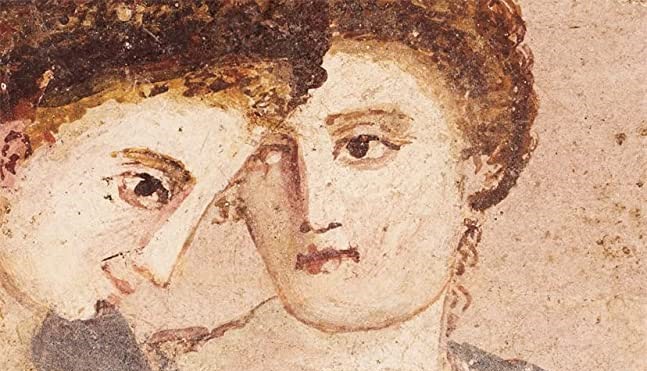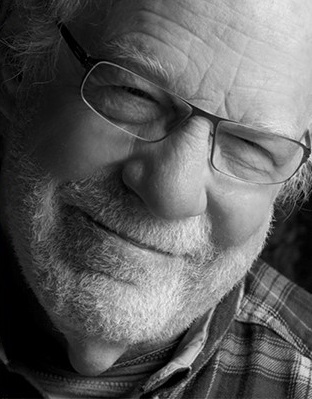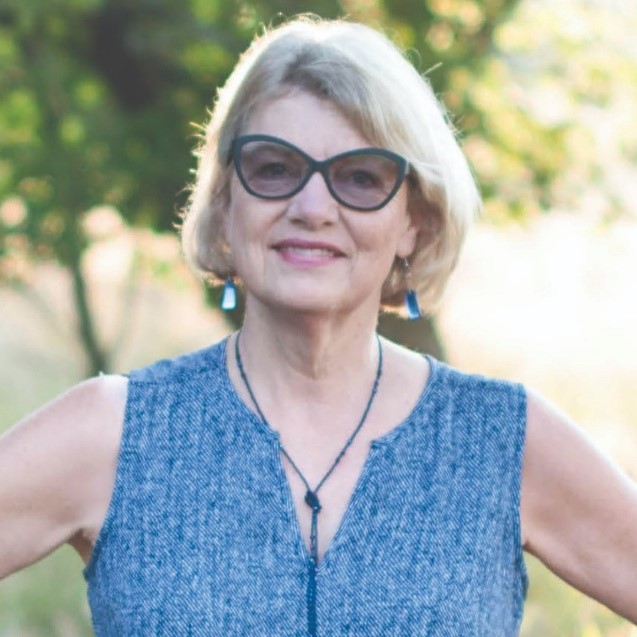Written by Anna Stowe, Creative Writing major
Down the spiral staircase nestled in the center of the Herrick District Library is an auditorium, filled with chattering spectators, all looking in anticipation toward the honey-colored stage. At 7:00 sharp, the room stilled, as eyes were drawn toward two cozy, green armchairs divided by a small table piled with books. Truly, it was a book lover’s dream—the perfect setting for the fifth and final event of the 40th anniversary of the Jack Ridl Visiting Writers Series, featuring a conversation between Jack Ridl and Anne-Marie Oomen.
In 2006, the Visiting Writer Series was named after Jack Ridl, honoring his commitment to storytelling, promoting poetry literacy, and mentoring writers of all ages—often in his own home. Beyond helping others to grow in their writing journeys, Jack continues to tell stories and has published ten lauded collections of poetry, most recently St. Peter and the Goldfinch, along with five anthologies. Working with his wife Julie, Ridl has devoted his life to helping others encounter the written word as it is read aloud in community.
After Jack Ridl’s introduction, Anne-Marie Oomen was invited to the stage to discuss her book As Long as I Know You: The Mom Book. This memoir recently received the Sue William Silverman Prize in Creative Nonfiction, one of the highest awards in the genre. Focused on her relationship with her mother, the memoir is best described by a quote from Oomen’s website: “The story of one daughter’s journey to her mother’s heart.”
Jack and Anne-Marie settled into their chairs, old friends excited to talk about their work. Jack began by cracking jokes. Surveying the audience, he said, “I’m gonna let Anne-Marie take over the whole thing—I haven’t prepared at all. I don’t care if they named the damned thing after me.” Ripples of laughter swirled through the crowd, any nerves disappearing at once. Knowing he had won his audience over, Jack kicked off the conversation with Anne-Marie, asking her to read a selection from her memoir. She chose to read the prologue “Cessation,” which was written immediately after her father died, leaving her mother alone. “I have not been a good daughter, and I don’t intend to start now … I know nothing really of [my mother]” she read. With these haunting words stealing the breath from the room, Anne-Marie introduced her difficult relationship with her mother.
Jack then asked Anne-Marie whether there was an evolution in her writing toward this memoir, and how she had compiled ten years of notes into a single volume. Anne-Marie explained that, in her previous books, she had tried to honor her mother and respect her privacy. After her father died and her mother’s dementia became evident, Anne-Marie slipped into anticipatory grief, knowing that her mother would soon be gone. As her mother started to fade, Anne-Marie began writing notes, recording conversations and thoughts, and working through her broken relationship with her mother. “As I’m losing her, I’m finding her through the writing,” she explained. Still, Anne-Marie was unable to finish her memoir for quite some time—she did not want to end with her mother’s death.
After reading another excerpt from the novel about an incident in which her mother was fully lucid following months of silence, an audience member asked Anne-Marie how she prepared to write about emotionally charged events and then revise that writing. With a smile, Anne-Marie described her writing process: “I was blocked for two years previous to her death, trying to find a way through it. After her death, I was catapulted by grief to dive back into the project to process my emotions.” Returning to the project so quickly allowed Anne-Marie to feel her mother’s presence and hear her voice. As she revised, she could see the life they had lived and the life she learned they lived through her writing. This knowledge transformed her grief into a companion rather than a burden.
Hearing about Anne-Marie’s grief in such a personal way prompted a question from the audience: “Could you have loved your mother better?” For Anne-Marie, the answer was yes. She said, “I think I will always carry some regret and remorse. The memoir is deeply personal, but underpinning everything are the problems in the healthcare system. It’s incredibly difficult to get aid and the elderly suffer the most in this process. I will always be haunted that my siblings and I could not take my mother into our homes and care for her.” Jack agreed with Anne-Marie wholeheartedly: “Are we betraying our elders? Yes, we are. We don’t honor them or care for them enough.”
Anne-Marie soon diverted the conversation to Jack, asking him to read one of his poems from her dog-eared copy of Practicing to Walk Like a Heron. As she searched for a poem, Jack quipped, “By the way, I have PTSD. I mention that to get sympathy and to mention that [Anne-Marie’s] mother wouldn’t have had access to the help that I’ve had that allows me to sit here today.” Anne agreed, recalling the secrecy both of mental health struggles and rural farm life. She then asked Jack to read his poem “Listening to Chopin in Early Winter.” Jack’s voice lilted across the auditorium, casting a spell across the audience. As he breathed the last line, “There is duration,” the room was filled with hope. Later, Jack read a second poem from this book called “It Wasn’t Folklore.” Anne-Marie requested that Jack read this poem, stating, “I love the irony of the poem. Because we think it’s folklore and we want it to be, but at the heart, it’s not. There are so many more layers to life.”
At this point, the floor opened once again to questions from the audience. Because Anne-Marie writes primarily about her family, she was asked whether she would have published if her siblings objected to her writing—essentially asking where Anne-Marie found the balance between private life and the essence of her story. Anne-Marie explained that she has learned to self-regulate her own consciousness of what she should and should not say ahead of the curve. Once the story is out in the world, though, Anne-Marie stated that she sees her writing like any piece of art. At that point, her work has been handed off to the reader and is separated from her despite still being her own story.
As the evening drew to a close, Jack and Anne-Marie discussed their writing journeys and how words became the foundation of their lives. Anne-Marie encouraged the audience, stating that “ultimately it’s an individual journey. If you’re driven, you’ll be able to find your own path.” Sometimes this path may look like notes scribbled on the back of receipts, journaling in spare moments, and spending hours crafting a manuscript. It may look like taking classes, going to conferences and lectures, and building a writing community. No matter the journey, Jack said it best: “Everyone should be writing. It doesn’t matter if the writing is good if it has value.” Stories have the power to heal and bring people together, building bridges across cultures and generations.





Hi Anna,
Masterful, your personal essay. It felt as if I was once again there, all relaxed, the feeling of everyone just hanging out. I could really feel the ambience, could sense the presence of everyone.
It was remarkable how seamlessly you wove everything: the audience’s questions, Anne-Marie’s stunning choices of what to read including that electrifying closing, the sensibility differences between her and me that blended and revealed an amiableness and the love and respect we have for one another, how specific you were and how you selected particulars that evoked the whole of the evening, how your information wasn’t just”information” but was conversational, and how there was never a clunk along the way; you created a transparency that glided from opening to closing.
What a joy to read real writing, a real writer.
Oh do I ever wish you well!
Jack
Why has my comment not been approved?
Sorry, Jack, no one has been “at the wheel” of comment approval for a while. We’ll be more active from now on!